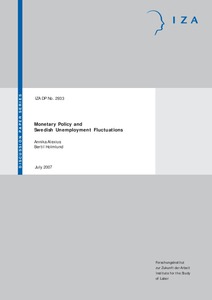Monetary policy and Swedish unemployment fluctuations

Alexius, Annika ; Holmlund, Bertil
Institute of Labor Economics, Bonn
IZA - Bonn
2007
27 p.
fiscal policy ; history ; monetary policy ; statistics ; unemployment
Discussion Paper Series
2933
Unemployment
English
Bibliogr.
"A widely spread belief among economists is that monetary policy has relatively short-lived effects on real variables such as unemployment. Previous studies indicate that monetary policy affects the output gap only at business cycle frequencies, but the effects on unemployment may well be more persistent in countries with highly regulated labor markets. We study the Swedish experience of unemployment and monetary policy. Using a structural VAR we find that around 30 percent of the fluctuations in unemployment are caused by shocks to monetary policy. The effects are also quite persistent. In the preferred model, almost 30 percent of the maximum effect of a shock still remains after ten years."
Digital
The ETUI is co-funded by the European Union. Views and opinions expressed are however those of the author(s) only and do not necessarily reflect those of the European Union or the ETUI.